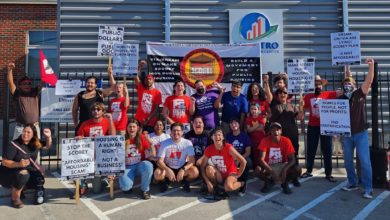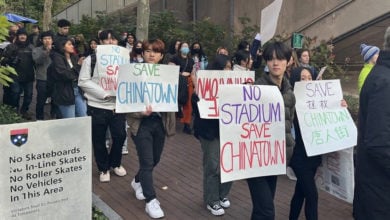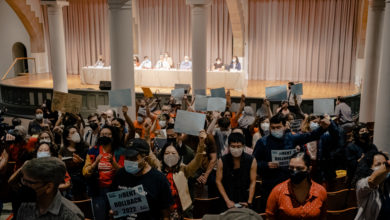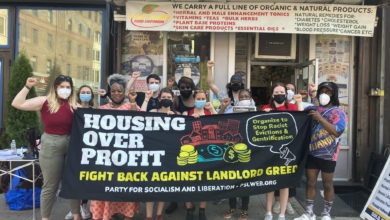Raleigh, North Carolina, residents have come together to protest the rezoning and development of Shaw University, speaking out at the April and May city council meetings and pushing back against the wealthy investors and realtors who stand to profit if the plan goes forward.
The public pressure campaign has already successfully forced Raleigh City Council to postpone their decision on the rezoning application a few times. Now, they are set to decide on June 20.
If approved, the application would allow developers to build for commercial and retail use, permanently closing Shaw’s King Khalid mosque and displacing the Black families who live in the neighborhood.
Islamaphobic attacks on King Khalid Mosque
Built in 1983, King Khalid mosque at Shaw University has been a place for Muslim residents to gather, worship and support each other. King Khalid was the first mosque built in Raleigh and holds an important place particularly for Black Muslims in the community.
According to Nigel Edwards, a board member of King Khalid masjid, Shaw has tried to close the mosque since the early 2000s. Official reasons focus on space: needing more room for offices or a gym. However, Edwards noted community speculation that the efforts to close the mosque, which began shortly after 9/11, are rooted in Islamophobia. He also indicated that the university neglected upkeep and maintenance of the mosque and shut down the school’s Islamic Studies department in the wake of the Sept. 11, 2001, terrorist attacks.
As the COVID-19 pandemic began, the university administration closed King Khalid mosque and has since refused to reopen the mosque, citing the risk from COVID. However, as the pandemic continued, the Chapel at Shaw, another religious institution on campus, was reopened for services while the mosque remained closed.
Now that there are plans to rezone and develop Shaw, the university administration says it plans to keep the mosque permanently closed. If the plans go forward, developers will replace the mosque with a commercial high-rise.
This decision has been met with fierce resistance from the local community, which feels that this is an act of erasure.
As Edwards puts it, “Our community has coalesced around our institution of the mosque as a religious community, a Muslim community. So by default, if you approve the rezoning application and in the process of going through it, our mosque is closed, and we’re not coming back, and the building where the mosque is subsequently destroyed, that amounts to gentrification, the erasure of a community for the purpose of development.”
The housing crisis and gentrification in Raleigh
Southeast Raleigh, a historically Black part of the city, has changed dramatically over the past few years. New developments and businesses have sprung up throughout Raleigh, raising housing costs and gradually displacing more and more people.
As property values in Raleigh continue to soar, property tax rates in the area are also skyrocketing. Many Black residents are being priced out of their longtime homes and neighborhoods. The historically Black character of these neighborhoods, such as the area around Shaw University in Southeast Raleigh, is being erased. In fact, within the last 20 years, downtown Raleigh has become 259% more white.
Rezoning areas of Shaw for commercial development would only worsen this crisis. Poor and working-class Black people who have lived in this area for generations should not be forced out for the profits of developers.
Save our Shaw: Shaw University’s legacy and education
Amid the ongoing far-right, racist assault on the country’s education system, including the bans on so-called “critical race theory,” it is crucial to defend and preserve historically Black colleges and universities like Shaw.
An important site for the history of the civil rights movement, Shaw was the first university to offer courses to Black people in the South. Estey Hall, built at Shaw in 1874, was the first building dedicated to higher education for Black women in the United States.
Shaw is also the alma mater to civil rights leader Ella Baker, who was influenced by her education at the university and later came back to campus where she helped found SNCC, the Student Nonviolent Coordinating Committee.
If it moves forward, the development plan will damage the historic legacy of Shaw’s campus by moving and possibly damaging historic buildings.
Environmental impacts
Many Shaw alumni oppose the rezoning and have formed a coalition called Save Our Shaw. Keisha Monk, one of the founders of Save our Shaw, expressed concern about the environmental impact of the prospective development plan, noting “[in Southeast Raleigh] there is already a major flooding issue. I have firsthand seen rainwater build up with nowhere to go, and this development will only make it worse.”
The rezoning and resulting construction will replace water absorbent soil with concrete and force a considerable amount of rainwater downhill, increasing flooding in Black neighborhoods in Southeast Raleigh.
Carmen Cauthen, a local activist for racial justice and respected leader in Raleigh’s Black community, has also raised concerns about the environmental impact of Shaw University’s plans for rezoning and development: “For each sq. foot of space that is vacant now, and rain water can drain into the soil, the effect of these buildings would be like forcing 18x the amount of water to run downhill and into the creeks and streams.”
Black and working class residents of North Carolina already bear the brunt of environmental injustice in the state, and further development will only make it worse.
Community members continue to fight back
The mounting resistance at Shaw University and in Southeast Raleigh shows that when we unite and fight together, we can win. The city council has wavered under the pressure, responding to widespread public outcry by delaying the rezoning vote. However, the fight is not over yet.
The community will mobilize again on June 20 at 1:00 p.m. at Raleigh City Council to demand that council members deny Shaw University’s rezoning application.





